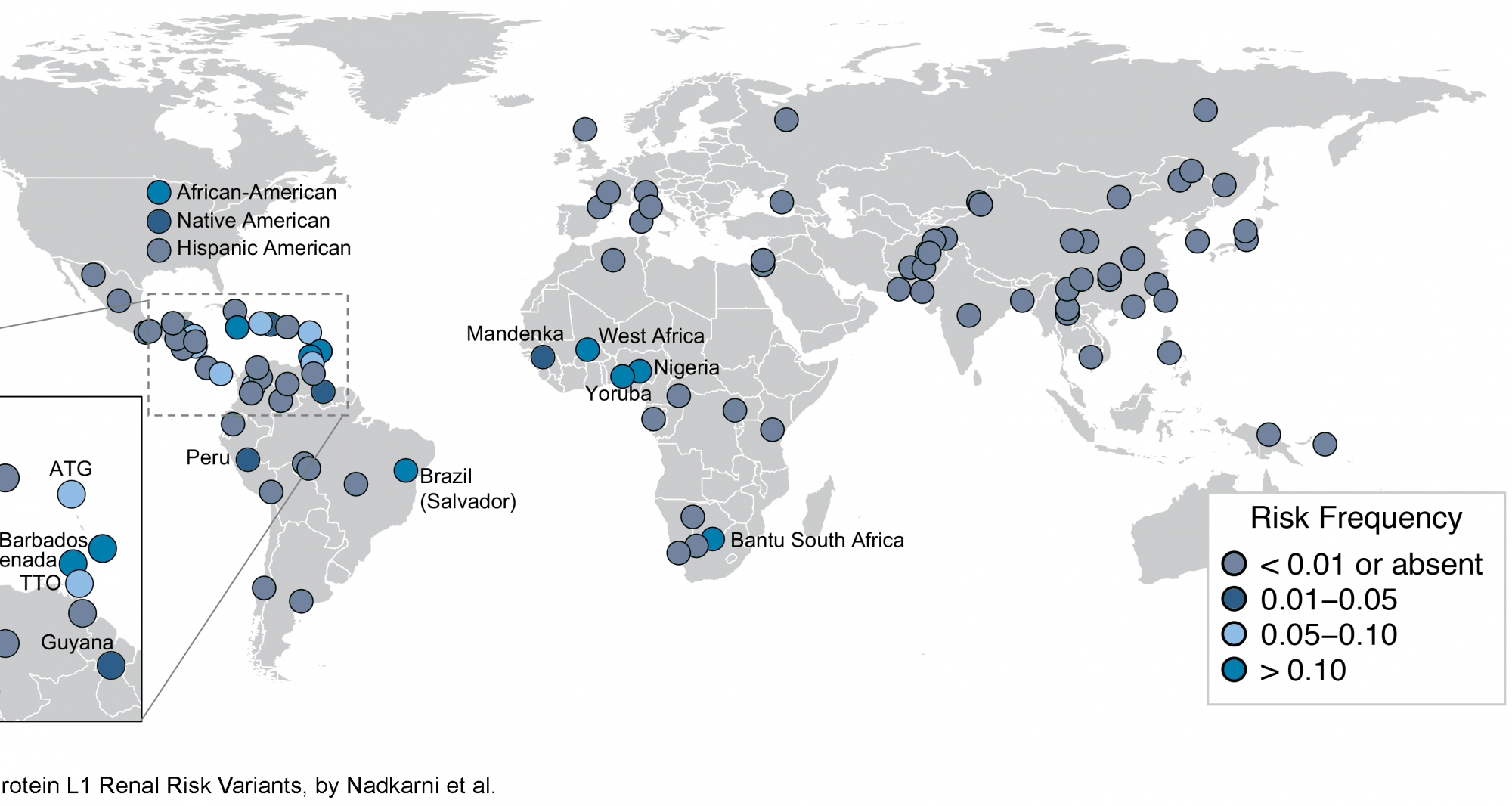Fellow Grants
American Diabetes Association Postdoctoral Fellowship
(Heather Highland)*
*Under the mentorship of Kari North.

American Diabetes Association
Project Number:
2019-2021
Identification of pleiotropic loci affecting type 2 diabetes, adiposity, and renal disease
View Abstract Genetic susceptibility underlies diabetes, adiposity, and renal diseases. Studies of pleiotropy, variants that affect multiple phenotypes, have the potential to clarify molecular functions, identify mechanistic “common denominators”, and prioritize variants for functional interrogation. Systematic and comprehensive interrogation of pleiotropy is particularly relevant for adiposity, diabetes, and renal phenotypes; decades of human and animal studies support a shared genetic architecture that collectively affects downstream clinical disease. Despite disproportionately affecting African Americans (AA) and Hispanic/Latinos (HL), the majority (>80%) of genome wide association studies (GWAS) participants to-date are of European ancestry. This research disparity biases understanding of human variation, fails to leverage the unique genetic architecture of AAs and HLs for fine-mapping, and hinders translation of genetic findings into clinical and public health applications relevant for broad populations. Using harmonized data from the Population Architecture Using Genomics in Epidemiology (PAGE) consortium this research aims to identify loci with potential evidence of pleiotropy within and across diabetes, adiposity, and renal traits; (Aim 1) leverage population structure, haplotypic architecture, and phenotype correlation through multi-phenotype fine-mapping to prioritize variants for further interrogation; (Aim 2) and implement pathway models to disaggregate variants displaying evidence of biological pleiotropy (i.e. variant affects multiple phenotypes due to shared biology) from variants displaying evidence of mediated pleiotropy (i.e. variant influences one phenotype and this phenotype influences a second phenotype) (Aim 3). By investigating pleiotropy, the proposed work will clarify shared mechanisms, which has the potential to inform phenotype classification, drug development and repurposing, and diabetes and renal disease prevention.
NHLBI F32 Research Postdoctoral Fellowship
(Moa Lee)*
*Under the mentorship of Christy Avery.
 National Heart Lung and Blood Institute
National Heart Lung and Blood Institute
Project Number: F32HL149256
2020-2021
A Phenome-wide association study to identify and characterize phenotypic effects of LP(A)
View Abstract This NIH Kirschstein-NRSA postdoctoral fellowship (F32) application is designed to promote the training of Dr. Moa Lee, PharmD, MPH, a post-doctoral fellow and concurrent Epidemiology PhD student at the University of North Carolina, and to provide her with the foundation for an independent research career. Building upon her clinical training and research experience in the fields of pharmacy and pharmacoepidemiology, Dr. Lee’s goal is to expand her research horizon into pharmacogenomics research under the sponsorship of two highly successful genetic epidemiologists. This advanced training will enable Dr. Lee to further contribute to advancing the clinical knowledge and research base underlying optimal treatment decisions. The proposed research project is deliberately designed to leverage Dr. Lee’s research experience using dense phenotypic data while providing extensive training to acquire the remaining competencies in genetic epidemiology and career development. Driven by the need to improve current prevention and treatment strategies for cardiovascular disease (CVD), Dr. Lee will interrogate lipoprotein (a) [Lp(a)]. Emerging evidence has identified Lp(a), a highly atherogenic, low density lipoprotein-like moiety, as an attractive novel therapeutic target. Given that the current understanding of the role of Lp(a) in CVD is limited, particularly with respect to emerging evidence that Lp(a) may affect a broader range of phenotypes, the proposed research will comprehensively interrogate the effects of Lp(a) on health and disease. Specifically, Dr. Lee proposes a phenome-wide association study (PheWAS) of Lp(a), a novel approach to assess the effects of Lp(a) across a broad range of phenotype domains. By helping ensure temporality in exposure effects and limiting bias from confounding, a Lp(a) PheWAS is uniquely positioned to provide new insights into the underlying pathogenesis of Lp(a), uncover novel associations, and, ultimately, inform understanding unanticipated side effects of potential treatments. Dr. Lee’s deliberate selection of a large (n~600,000), deeply phenotyped, multi-ethnic population spanning early to late adulthood with a large proportion of females will increase the generalizability of study findings. Together, this proposal will provide Dr. Lee with a solid foundation in genetic epidemiology. The knowledge and experience as well as the preliminary data afforded by this proposal will provide the groundwork for Dr. Lee’s future research agenda as well as investigator-initiated applications as she embarks on an independent and interdisciplinary research career.
NIH F31 Research Fellowship Award
(Shelly-Ann Love)*
*Under the mentorship of Kari North.
 National Institute on Alcohol Abuse and Alcoholism
National Institute on Alcohol Abuse and Alcoholism
Project Number: F31AA024971
2016-2018
Ethanol-metabolizing genes and the relationship between ethanol intake and cognitive decline
View Abstract This pre-doctoral fellowship (F31) grant application is designed to promote the training of Shelly-Ann Love, a pre-doctoral student in the Department of Epidemiology at the University of North Carolina. Her goal is to become an independent researcher who conducts innovative, translational health research. During the F31 training the applicant will be mentored by her sponsors Drs. Kari North and Gerardo Heiss. The topic of the proposed research is a multidisciplinary assessment of the role of ethanol intake in age-related cognitive decline, as modified by genetic susceptibility. Because of the increasing number of older adults the prevalence of dementia will quadruple from 5.2 million to 16 million by 2050, with an expected increase of healthcare cost from $203 billion to $1.2 trillion. Studies of the association of ethanol intake with cognitive decline and dementia have yielded inconsistent findings, likely attributable to a reliance on a single measurement of ethanol intake, non-standardized definitions of cognitive decline, outdated classifications of dementia, short follow-up times, and or lack of analytic control of confounders and effect measure modifiers. Few studies investigated the effects of ethanol intake in black populations despite the higher prevalence, incidence, and cumulative risk of Alzheimer’s dementia in blacks compared to whites. Importantly, no study has investigated the effects of ethanol intake on cognition from mid-life to older adulthood. Further, variation within ethanol- metabolizing genes alters the rate of ethanol oxidation, yet few studies have evaluated effect measure modification of the ethanol intake-cognitive decline relationship by genetic variation in ancestrally diverse populations. Thus, studies based on diverse populations with repeated measurements of ethanol intake and cognitive function that have been genotyped for ethanol-metabolism SNPs are needed to better understand the relationship of ethanol intake with cognitive decline.
These aims will be met through the training proposed in this application and the doctoral research based on the bi-racial, population-based Atherosclerosis Risks in Communities (ARIC) cohort of 12,773 black and white adults between the ages of 45-64 years at intake. Analyses will include repeated measurements on participants who attended 5 examinations over 20 years of follow-up. This research responds to a need to identity susceptibility and modifiable behavioral factors that might prevent, or delay the progression of cognitive decline and dementia. The potential impact of the study is its ability to contribute new information on the putative effects of ethanol intake on cognitive decline, and the potential public health risks and benefits of ethanol intake.
NHLBI K99 Research Fellowship Award
(Anne Justice)*
*Under the mentorship of Kari North.
 National Heart, Lung, and Blood Institute
National Heart, Lung, and Blood Institute
Project Number: K99HL130580
2016-2018
Sex- and Smoking- Specific DNA Methylation Signatures of Central Adiposity Change
View Abstract This is a NHLBI K99/R00 grant proposal, intended to promote my career as a post-doctoral fellow at the University of North Carolina, into independence as a genetic epidemiologist with a focus in obesity epigenetics. I am a trained anthropological geneticist with extensive experience in genetic epidemiology and a strong track record of innovative and informative research. Research and Career Goals: My over-arching research goal is to integrate my skills as an anthropologist, population geneticist, and epidemiologist, using the bio-cultural and public health perspectives to identify genetic, epigenetic and environmental factors that influence obesity and downstream cardiometabolic disease (CMD) across the lifecourse. Related to this, my long-term career goals include securing a faculty position at a research university where I will continue my research on the genetic and environmental factors that influence risk of CMD as an independent researcher and educator. Career Development: I will develop: 1) expertise in the pathogenesis of obesity, 2) a strong foundation in longitudinal data analysis, and 3) the theoretical and analytical skills specific for epigenetics research. My training and proposed research will be overseen by a talented group of mentors, including my primary mentor, Kari North, a renowned genetic epidemiologist that will provide expertise in integrating genetics and epigenetic analysis and methods; and my co-mentors, Penny Gordon-Larsen, a nutritionist and internationally recognized obesity expert; Yun Li, a biostatistician and geneticist with expertise in the development and application of analytical methods for genetics and epigenetics; Annie Green Howard, a biostatistician that specializes in longitudinal data analysis; Ellen Demerath, consultant, a lifecourse CMD epidemiologist with experience in methylation research; and Eric Whitsel, collaborator, a CVD epidemiologist and physician with experience in pharmacogenomics. Research Project: The proposed project aims to identify methylation variants (meQTLs) associated with increased central adiposity and for which the effects may be influenced by environmental exposures (sex, obesogenic medications, smoking) in the African American participants of the Atherosclerosis Risk in Communities (ARIC) study. In the K99 phase, I will conduct an epigenome wide association analysis (EWAS) with central adiposity using methylation data from a single time point and while accounting for environmental exposures. During the R00 phase, I will collect de novo methylation data using stored biospecimens from visit five to implement longitudinal, multilevel, and mixed models to examine differential epigenetic effects on central adiposity by age and time, and to examine the causal relationships between central adiposity change, methylation, and environmental exposures. Projects, like that proposed herein, allow us to identify epigenetic variation that influences central adiposity, and are critical to gain a comprehensive understanding of the pathogenesis of obesity. The results of this study and the continued protected training time will ultimately launch my career in lifecourse obesity epigenetics.
Mid-Atlantic Affiliate Winter 2013 Predoctoral Fellowship
(Lindsay Fernández-Rhodes)*
*Under the mentorship of Kari North.

American Heart Association
2013-2015
Acculturation and its interaction with genetic obesity susceptibility among United States Hispanics
View Abstract Obesity is a major cardiovascular risk factor and constitutes a global health epidemic. Within the last few decades major changes in obesity within the United States (U.S.) and world have ensued. National prevalence estimates U.S. Hispanics 20 years or older estimate that over a 1/3 were obese (2009-2010). As of 2010 Hispanics now comprise the largest United States (U.S.) minority. Gene-environment (GxE) interactions may account for the recent upward shifts in the distribution of body mass index (BMI). Given the pace of the epidemic, it is unlikely that recent changes in genetics have led to the epidemic and disparities in the U.S. Yet, the concurrence of genetic predisposition and an increasingly obesogenic environment is likely responsible. Acculturation can be measured in a variety of ways (e.g. nativity, generational status, length of residence, age at immigration and using validated scales), and represents both early life and sociocultural risk factors, as well obesogenic life course trajectories. In this way, acculturation can be considered a general marker of cardiovascular risk during migratory transitions. Genome-wide association studies (GWAS) have led to the discovery of over 50 adult BMI, single nucleotide polymorphisms (SNPs) within the past decade. However, none have been conducted exclusively among U.S. Hispanics or integrated environmental information such as acculturation. Efforts to generalize SNP findings from European descent populations have not been successful due, in part, to linkage disequilibrium patterns across minority groups. This suggests that genetic studies in non-European and admixed populations, such as U.S. Hispanics, can enhance our understanding of the genetic architecture and public health burden among these groups. Therefore, we propose to describe the acculturative status of a large diverse sample of adult U.S. Hispanics in the Population Architecture using Genomics and Epidemiology Study (PAGE), and investigate the role of acculturation in the genetics of obesity. To answer this question we will first estimate the relationship between acculturation and BMI among up to 26,000 U.S. Hispanics. Secondly, as informed by our previous work we will conduct a gene-acculturation study in up to 22,000 U.S. Hispanics at 25 validated BMI loci genotyped on the MetaboChip (Illumina, San Diego, CA) as part of the PAGE Study.
Mid-Atlantic Affiliate Winter 2016 Predoctoral Fellowship
(Ann Von Holle)*
*Under the mentorship of Kari North.
 American Heart Association
American Heart Association
2016-2018
Infant growth trajectories and dyslipidemia in adolescence
 National Heart Lung and Blood Institute
National Heart Lung and Blood Institute National Institute on Alcohol Abuse and Alcoholism
National Institute on Alcohol Abuse and Alcoholism National Heart, Lung, and Blood Institute
National Heart, Lung, and Blood Institute


